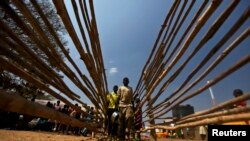GENEVA —
The U.N. refugee agency is starting a mass immunization campaign to contain the spread of measles among South Sudanese refugees in northern Uganda. The Ugandan Ministry of Health confirms an outbreak of this killer disease among the more than 59,000 South Sudanese who crossed the border since fighting erupted across South Sudan last month.
So far, the Ugandan Ministry of Health reports it has registered five cases of measles, and three suspected cases among refugees in the Arua area, near the border with South Sudan.
The U.N. refugee agency says the immunization campaign will cover all refugee and Ugandan children in the Arua and Adjumani districts under age 15.
UNHCR spokesman Adrian Edwards says there will be a concerted effort to reach all newly-arriving refugee children after this mass vaccination campaign ends. He says the children will be systematically screened to make sure they all are protected.
“We are still receiving around about 250 refugees a day at the reception center in Adjumani. Recent arrivals appearing visibly weaker-much less luggage. It appears people are coming from rather further afield in South Sudan than we have had until now," said Edwards.
Edwards says the outbreak of measles among this vulnerable group is not altogether surprising. He tells VOA conditions in the overcrowded, squalid transit camps are likely to be a breeding ground for the spread of disease.
He says the areas in northern Uganda to which the South Sudanese refugees are fleeing are designed to cope with a few hundred people - not the many thousands who have arrived.
“This has put enormous pressure on the areas into which people come-pressures of all kinds. In simply housing people, in getting sanitation and water there, health risks have been a major concern in this environment. I think in that sense, it is not entirely surprising that we are seeing something like this happening," he said.
At the moment, he says measles is only being reported from Uganda. He says no similar outbreaks have been reported from other countries to which refugees are fleeing.
The UNHCR reports more than 100,000 South Sudanese have entered Uganda, Ethiopia, Kenya, and Sudan since mid-December.
South Sudan’s government and rebels signed a ceasefire agreement in the Ethiopian capital, Addis Ababa on Thursday. They have pledged to stop the fighting, which has killed thousands of people, within 24 hours. The UNHCR welcomed the ceasefire, though rebels Friday accused the government of breaking it.
It says it hopes the ceasefire will be implemented quickly to avert further displacement within and outside the country. In the meantime, UNHCR spokesman Edwards says his agency continues to hear reports from inside South Sudan of more people preparing to cross into Uganda.
So far, the Ugandan Ministry of Health reports it has registered five cases of measles, and three suspected cases among refugees in the Arua area, near the border with South Sudan.
The U.N. refugee agency says the immunization campaign will cover all refugee and Ugandan children in the Arua and Adjumani districts under age 15.
UNHCR spokesman Adrian Edwards says there will be a concerted effort to reach all newly-arriving refugee children after this mass vaccination campaign ends. He says the children will be systematically screened to make sure they all are protected.
“We are still receiving around about 250 refugees a day at the reception center in Adjumani. Recent arrivals appearing visibly weaker-much less luggage. It appears people are coming from rather further afield in South Sudan than we have had until now," said Edwards.
Edwards says the outbreak of measles among this vulnerable group is not altogether surprising. He tells VOA conditions in the overcrowded, squalid transit camps are likely to be a breeding ground for the spread of disease.
He says the areas in northern Uganda to which the South Sudanese refugees are fleeing are designed to cope with a few hundred people - not the many thousands who have arrived.
“This has put enormous pressure on the areas into which people come-pressures of all kinds. In simply housing people, in getting sanitation and water there, health risks have been a major concern in this environment. I think in that sense, it is not entirely surprising that we are seeing something like this happening," he said.
At the moment, he says measles is only being reported from Uganda. He says no similar outbreaks have been reported from other countries to which refugees are fleeing.
The UNHCR reports more than 100,000 South Sudanese have entered Uganda, Ethiopia, Kenya, and Sudan since mid-December.
South Sudan’s government and rebels signed a ceasefire agreement in the Ethiopian capital, Addis Ababa on Thursday. They have pledged to stop the fighting, which has killed thousands of people, within 24 hours. The UNHCR welcomed the ceasefire, though rebels Friday accused the government of breaking it.
It says it hopes the ceasefire will be implemented quickly to avert further displacement within and outside the country. In the meantime, UNHCR spokesman Edwards says his agency continues to hear reports from inside South Sudan of more people preparing to cross into Uganda.




